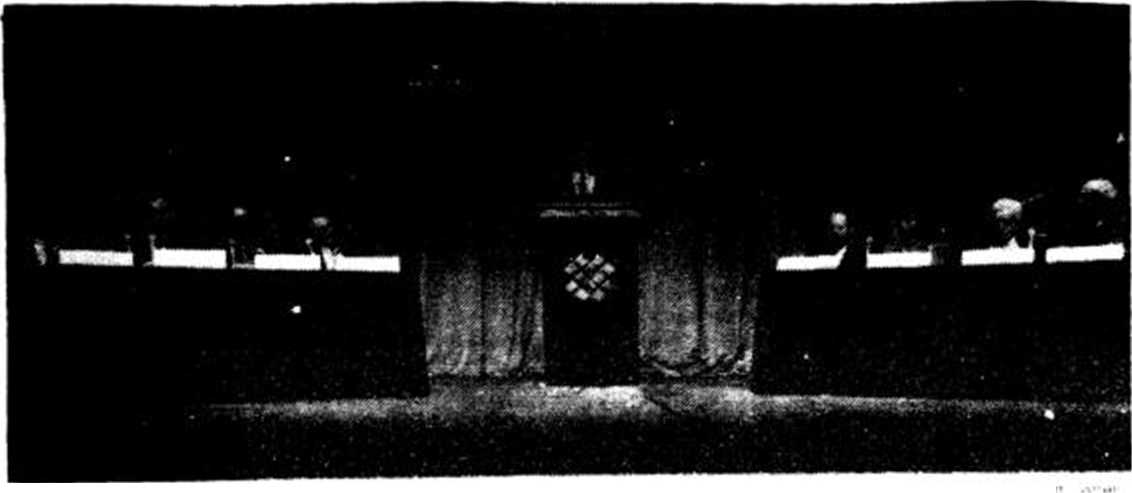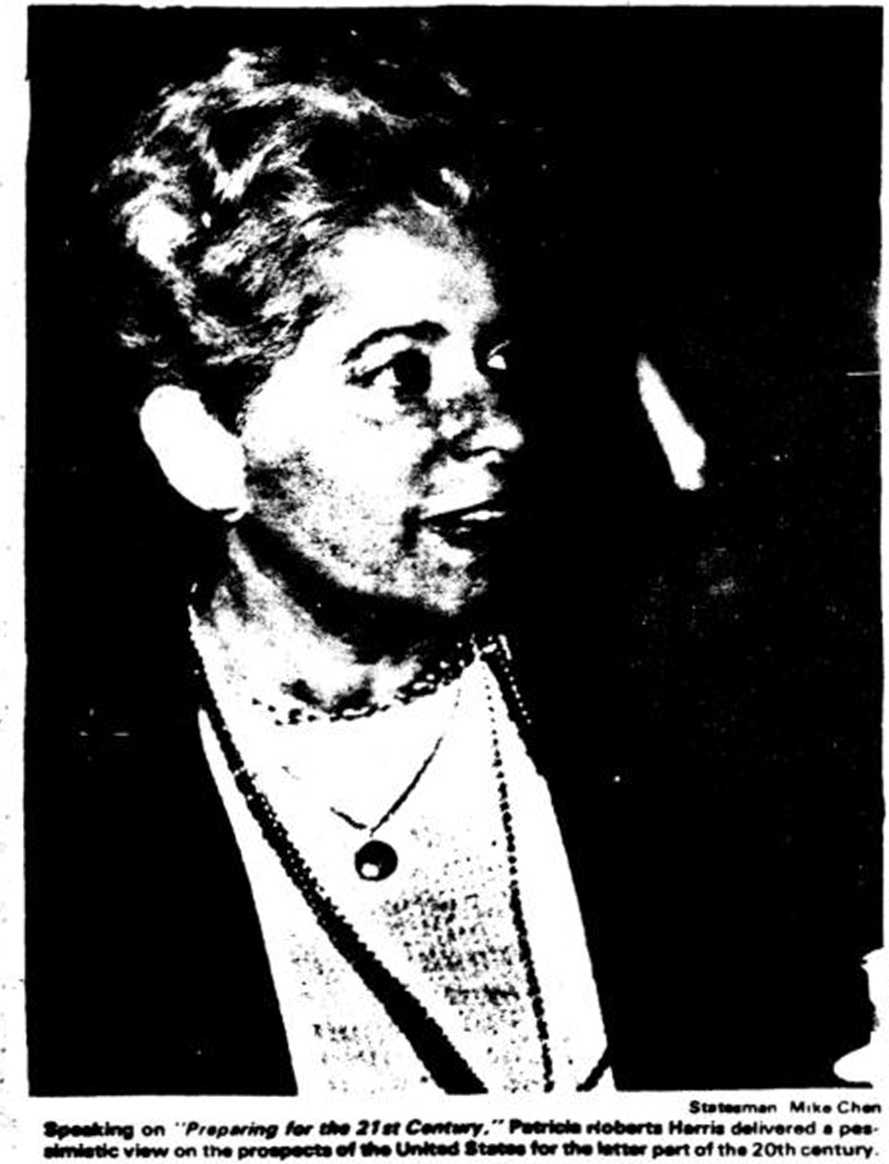6585844665

A__ _A -----k Aa a a* Ai i
By Chrfetopher Maryano polis
Academic freedom. academic responsibility, and aociety were the main iaauee discussed at aaympoeium last night in the Fine Arta Center. Morę than 360 - people listened to the panel of guests lecture about the importance of the university and aociety.
Provoat Homer Neal welćomed the audience and participanta and explained that the purpoee of the discussion was to explore the boundaries of academic freedom and reeponsibiity.
The firat speaker. Sidney Hook of the Hoover Insti-tute on War. Revolution and Peace at Stanford Univer-aity, explained the implications of academic freedom and responsibility. "Academic freedom is not the freedom to teach the truth," he said, "but the freedom to eeek the truth...Academic freedom ia a rightthat must be earned."
Hook explained that supporting academic freedom ia the asaumption that a univeraity is searching for the truth. Hook said he believes that the State shouldn't have to inveatigate queationa of profeasional ethics.
Rabbi Arthur Seltzer, the Long Island Regional director of the Anti-Defamation League of B'nai B’rith. addresaed the audience about the commitment of academic freedom within a university. TJniverai-ties are centers of power and centera of leaming in which the componentof academic reeponaibility playB a main role." he aaid.
Laura Blackboume. counsel to the New York State branch of the National Aaaociation for the Advancement of Colored People (NA AC P), said diacipline iaan *area of apecialization and the proceea of becoming credentialed.” She said. ‘The university is the market place for exchange of ideas and treedom."
Sumner Roeen of the School of Social Work at Columbia Unireraity aaid the community ahould raise questions. but that SolutionsshouId be found within the autonomy of the university. Roeen felt that academic freedom is aasociated with theobligations and respon-aibilities of being and inatructor. Roeen said. The real issues of academic freedom tend to be within the ‘pow-ers that be' of the university."
Richard Teevan of the Psychology Department said. The official anawer to the iaaue of academic freedom haa tocome from the university and in particular. from the department itaelf.”
Monroe H. Freedman, profeaaor of law and former dean of Hofatra Univeraity School of Law. aaid he waa •diatreaaed with attacka on academic freedom. Freedman taiked mainly about the teachinga of Stony Brook profeaaor Ernest Dube. w ho last year taught a claaa which allegedly linked zioniam and raciam, aauggea-tion Freedman said he strongly disagreed with.
Ralph Brown, a professor of law at Yale University. said. "Freedom is morę i m por tan t than responsibility. but freedom can be abused."
After the participanta completed their speeches there waa an open discussion involving the audience. Dube. a member of the audience, aaid he never aaid zioniam is raciam. "In the couree we tried toaee if there waa any true raciam in zioniam." aaid Dube. Seltzer responded by saying that the title of Dube'a ayllabua aaid. "Zioniam is aa much raciam aa Naziam was racism."
Univeraity Preaident John Marburger cloeed the aympoeium with a ahort speech about academic freedom. Marburger aaid. "It ia important to have a group deeignated to think about academic freedom."
GWULaw ProfLectures on Futurę Society Goals

By Michael Chen
Patricia Roberts Harris, professor of Law at George Washington University. concluded the 1983-1984 Distinguished Lecture Series with a talk entitłed. ”Pre-paring for the 2lut Century. “Though the atlendance of the Monday night lecture at the Fine Arts Center Main Stage was Iow. the audience asked numerous ques-tions at the lecture and at a reception held afterwards.
Throughout the lecture. Harris urged that political leaders be chosen and *>eietal decisions be madę bascd on rational discourse" instead of popular feeling. The current trend where “most people are caught up in [becoming financially secure|or inseeking power... .ind have forgotten justice. fairness. •iecency and the need to fight for peace” just one indication that we “appear to he prepanng for disaster and destruc-Mon in the twenty-first century."
As a student during World War II. Harris assembled bombing mapsfor the \ .r Force and she recalled that one set f map* was for the city of Nagasaki. “ I .«n never forget that that city...aaw .«|pardevastation perhapsas the result : a map I put into a pilot s hook ." She autioned that we)iveinapivotai period •f human history where "nuclear -*• n*nce can make it possible to destroy the world “or where” the same break-Throughs of human intellect make it {Missible to diagnose and cure diseases which were... uncurablejustafewyears ago.”
Harris graduated summa cum laude from Howard University and went to work as a program director in a Chicago YWCA. After a 10-year hiatus from academia Harris entered George Washington University Law School in 1955 where she eventua!ly received her law degree with honors.
During the 1960s Harris proceeded from being a staff member of the U.S. Department of Justice to becoming Associate Dean of Studenta at Howard University and eventually to becoming Professor of I^aw and Dean of the School of Law at Howard University. From 1965 to 1967 Harrisserved as the United States Ambassador to I.uxembourg.
From 1977 to 1981 Harris served suc-cessively as Secretary of Housing and Urban Development. Secretary of Health. Education. and Welfare. and Secretar>' of Health and Human Servi-ces. In doing so. she became the first woman to have served in three cabinet positions.
Harris was nominated by six members of the faculty and the lecture was co-sponsored by the W. Averell Harriman College for Policy Analysis and Public Management, located on the Stony Brook campus. She was nominated because she was “ a perfect exam-ple of a successful public service career." said Michele McTernan. assist-ant to the dean of Harriman College. In the lecture. Harris eommended the work of Harriman College in preparing people to make the appropriate changes in society ao that it will be possible to make it to the next century.
When Harris was selected for a cabinet positkm by the Carter Adminis-tration she was a strong advocate of equal treatment for minorities and women. As secretary of Housing and Urban Development, (HUDl. she insti-tuted the Urban Action Grants program which provided $<00 million per year to the renovation of cities.
STATESMAN Wednesday. May 9. 1984

Wyszukiwarka
Podobne podstrony:
IMG481 (Large) j] i>lMnfTT
krolwzor AA AA AAa AaA A A A A A A A A AA A AA A A A A A A A A A A A A A A A A A A A Ai Ai .A
f * 1 ba aa ii il W0hyVL na ■■ i? « 9 r_- —x :: u li ^ ^
■ & A A ■ ■■■» W - — A A . AA AA k t t AA. i Ai t A t t k A A A A A A AAA Hfn* IM • • •?
S0005 (3) AA AI > ADMET AK Aiix* ( 1*S ( IM i 1NZ d. r. liCCD e. e. BiWG II
Obraz (9) n (.-T ĄjiAA * ^Vai* Svt “1 C +343+7) = v3 -t ~t> Yi ) Vt a^
DSCN3666 -v-- :«c< i >*» *»**■7**.^ »*«•* • f/AA , ąi,** MłfV<łtt ,
screenshot 2 Not Just Not just a n o th e r random b I o g.. & orno i AmazingT
screenshot 2 Not Just Not just a n o th e r random b I o g.. & orno i AmazingT
9 (1516) li 1 ai r , t by HU ----
image097 (6) U. Nfctmirrio. Kal^larnur cłNw. Warom, a KKi?. isbn •y/H-aa-Gomc-n-s. c by waip 200? Z3
image143 (7) U. Nfctmirrio. X(zl.slcrnie akolitę, Wiremia 2007. isbn y/H-aa-Gornc-n-a. c by waip 200
Even a Monkey?n Draw Manga v01 p121 Looking over my bookshelves, I m so impressed by the penman
więcej podobnych podstron